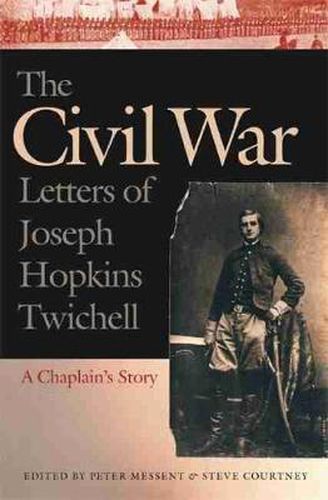Readings Newsletter
Become a Readings Member to make your shopping experience even easier.
Sign in or sign up for free!
You’re not far away from qualifying for FREE standard shipping within Australia
You’ve qualified for FREE standard shipping within Australia
The cart is loading…






In 1861 young Joseph Twichell cut short his seminary studies to become a Union Army chaplain in New York’s Excelsior Brigade. A middle-class New England Protestant, Twichell served for three years in a regiment manned mostly by poor Irish American Catholics. This selection of Twichell’s letters to his Connecticut family will rank him alongside the Civil War’s most literate and insightful firsthand chroniclers of life on the road, in battle, and in camp. As a noncombatant, he at once observed and participated in the momentous events of the Peninsula and Wilderness Campaigns and at the Second Bull Run, as well as at Fredericksburg, Chancellorsville, Gettysburg, and Spotsylvania.
Twichell writes about politics and slavery and the theological and cultural divide between him and his men. Most movingly, he tells of tending the helpless, burying the dead, and counseling the despondent. Alongside accounts of a run-in with slave hunters, a massive withdrawal of wounded soldiers from Richmond, and other extraordinary events, Twichell offers close-up views of his commanding officer, the political general Daniel Sickles, surely one of the most colorful and controversial leaders on either side.
Civil War scholars and enthusiasts will welcome this fresh voice from an underrepresented class of soldier, the army chaplain. Readers who know of Twichell’s later life as a prominent minister and reformer or as Mark Twain’s closest friend will appreciate these insights into his early, transforming experiences.
$9.00 standard shipping within Australia
FREE standard shipping within Australia for orders over $100.00
Express & International shipping calculated at checkout
In 1861 young Joseph Twichell cut short his seminary studies to become a Union Army chaplain in New York’s Excelsior Brigade. A middle-class New England Protestant, Twichell served for three years in a regiment manned mostly by poor Irish American Catholics. This selection of Twichell’s letters to his Connecticut family will rank him alongside the Civil War’s most literate and insightful firsthand chroniclers of life on the road, in battle, and in camp. As a noncombatant, he at once observed and participated in the momentous events of the Peninsula and Wilderness Campaigns and at the Second Bull Run, as well as at Fredericksburg, Chancellorsville, Gettysburg, and Spotsylvania.
Twichell writes about politics and slavery and the theological and cultural divide between him and his men. Most movingly, he tells of tending the helpless, burying the dead, and counseling the despondent. Alongside accounts of a run-in with slave hunters, a massive withdrawal of wounded soldiers from Richmond, and other extraordinary events, Twichell offers close-up views of his commanding officer, the political general Daniel Sickles, surely one of the most colorful and controversial leaders on either side.
Civil War scholars and enthusiasts will welcome this fresh voice from an underrepresented class of soldier, the army chaplain. Readers who know of Twichell’s later life as a prominent minister and reformer or as Mark Twain’s closest friend will appreciate these insights into his early, transforming experiences.